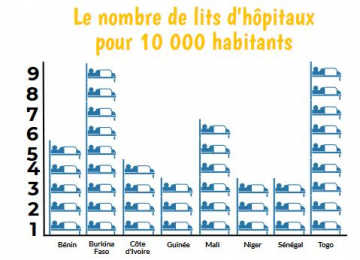
The e-health (or digital health) covers several areas of the health sector, from telemedicine to connected objects for prevention purposes, all the way to medical robotics. It is a fast growing sector considered as an important lever for the inclusion of millions of people around the world who lack access to healthcare.
Access to healthcare remains a major problem
Globally, one in five children do not receive essential vaccines. In West Africa, one in six children still do not live to the age of five.
Health coverage is often only available to elite groups.
Most of families in South Asia and Africa (9 out of 10 Africans have no health coverage) face financial difficulties in accessing a proper healthcare system, some are even going into debt. In developed countries such as the United States, the cost of healthcare and medical follow-up is staggering.
In Africa, the main causes of death are diarrheal diseases, pneumonia, HIV and chronic diseases. It is therefore time to improve access to information in terms of prevention and above all to provide care for patients in the continent, where there are barely 10 beds per 10,000 inhabitants, compared to 63 in the European community.

The areas affected by medical deserts are gaining ground to such an extent that there are 2 doctors per 10,000 inhabitants in Africa, compared to 32 per 10,000 in Europe.
According to the World Health Organization (WHO), Africa and Asia lack two million health professionals to provide care to the population.
eHealth: the explosion of digital therapies!
Mobile networks are evolving nowadays and enhanced connectivity has become a reality.
eHealth leverages all the technological advances, thus allowing an acceleration and a diversification of services among hospitals, professionals and patients in developed countries that have mastered their healthcare systems.
It will certainly liberalize access to healthcare in developing countries.
In Europe, this translates into an increase in digital therapies that treat, prevent or even manage patients suffering from a disease or health disorder.
In addition, video games are also considered as one of the non-medicinal therapies leading to surprising results for motor skills, spatial reference, reflexes, speed, and memory related to Alzheimer's diseases.
Digital therapies as a whole (software that augments or replaces traditional therapies) are expected to experience dramatic market growth, reaching $32 billion in 2024, up from just over $2 billion in 2019. eHealth as a whole, is expected to reach $234.5 billion in 2023 according to the “Global Health Outlook 2020 report.”
eHealth initiatives in Africa
Africa is experiencing a boom in the mobile phone ecosystem with large-scale projects linked to the development of quality infrastructures that are adapted to technological developments, thus benefiting the eHealth sector.
Several initiatives have been launched in recent years:
- Telemedicine in Tunisia to overcome the lack of specialized doctors and reduce medical deserts
- Connected incubators in Cameroon where a premature baby has 12 times less chance of surviving than in Europe.
- Health coverage through mobile insurance in Kenya.
- Awareness and information programs on health issues via SMS and voice messages in Burkina Faso.
- Connected telemedicine suitcase equipped with an ultrasound machine for prenatal consultations in Senegal.
Studies show that the health crisis has accelerated governments’ awareness of health sector issues, including the following:
- Improve and provide access for all to healthcare facilities that are generally concentrated in urban centers,
- Avoid inconvenient and costly travels for patients in remote areas,
- Facilitate the booking of appointments with professionals.
Medical record management: New challenge for eHealth
Beyond these aspects, new questions arise: the management of medical records involving the centralization of a large amount of data remains a sensitive issue for which appropriate solutions must be found.
Multiservice operators face countless B-to-B-to-C opportunities that could emerge and adapt to the eHealth maturity of states.
The landscape is changing. For example, Orange Group has just included its eHealth activities under the umbrella of its subsidiary Enovacom (since October 2020) in order to respond to four main challenges:
- The protection of health data,
- Exchanges and sharing between players in the healthcare ecosystem,
- The digitization of the Patient Pathway,
- The use of health data.
The development of eHealth solutions is a great opportunity for people who are farthest from the healthcare system, giving them access to better care.
In addition, issues related to the interoperability of health information systems are emerging. This should allow several states to reach the long-awaited level of maturity!






